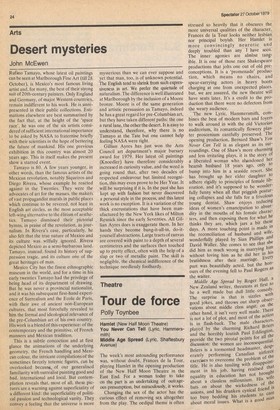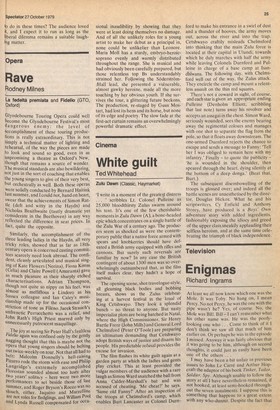Tour de force
Polly Toynbee
Hamlet (New Half Moon Theatre) You Never Can Tell (Lyric, Hammersmith) Middle Age Spread (Lyric, Shaftesbury Avenue) The week's most astounding performance was, without doubt, Frances de la Tour, playing Hamlet in the opening production of the New. Half Moon Theatre in the East End. For a woman today to take on the part is an undertaking of outrageous presumption, but miraculously, it works.
Changing the sex of the actor has the curious effect of removing sex altogether from the play. The oedipal theme is often stressed so heavily that it obscures the more universal qualities of the character. Frances de la Tour looks neither lesbian nor principal boyish. Her Hamlet is more convincingly neurotic and deeply troubled than any I have seen. The inner agonies are almbst tangible. It is one of those rare Shakespeare productions that jolts one out of old preconceptions. It is a 'promenade' produc tion, which means no chairs, and spear-carrying actors in heavy boots charging at one from unexpected places, but, we are assured, the new theatre will have seats later. It's a credit to the production that there were no defectors from the weary audience.
The new Lyric, Hammersmith, combines the best of modern bars and foyers to walk around in with the old Victorian auditorium, its romantically flowery plaster proscenium carefully preserved. The opening production, Bernard Shaw's You Never Can Tell is as elegant as its surroundings. One of Shaw's more charming and less irritating plays, it is the story of a liberated woman who abAndoned her bearish husband '18 years ago, only to bump into him in a seaside resort. She has brought up her elder daughter to adhere rigidly to principles of female liberation, and it's supposed to be wonderfully funny when all that priggish posturing collapses and she falls for a frivolous young dentist. Shaw enjoys reducing ideas of women's emancipation to absurdity in the mouths of his female characters, and then exposing them for what he thinks they are, which jars a bit the days. A more touching point is made in the reconciliation of husband and wife, wonderfully played by Sian Phillips and David Waller. She comes to see that she did him as much wrong in marrying him without loving him as he did her in his brutishness after their marriage. Every part was beautifully acted, but the how' ours of the evening fell to Paul Rogers as the waiter. Middle Age Spread by Roger Hall, a New Zealand writer, threatens at first to be a well made but dull little comedy. The surprise is that is sizzles with good jokes, and throws out sharp observations about middle class angst; on the other hand, it isn't very well made. There is not a lot of plot, and most of the action is in flash-back. The male characters, played by the charming Richard Briers and the horribly loutish Paul Eddingtnn, provide the two pivotal points for all the discussion: the women are inconsequential. Briers is a tormented headmaster, desperately performing Canadian airforce exercises to overcome the problem of the title. He is also tussling with disappoint" ment in his job, having realised utgbhatt equality in education has not bro about a classless millennium. His wife bats on about the wickedness of th.e unions, and his drunken cynical friend Is too busy bedding his students to carue about moral issues. What is a good in to do in these times? The audience loved it, and I expect it to run as long as the liberal dilemma remains a suitable laughing matter.



































 Previous page
Previous page